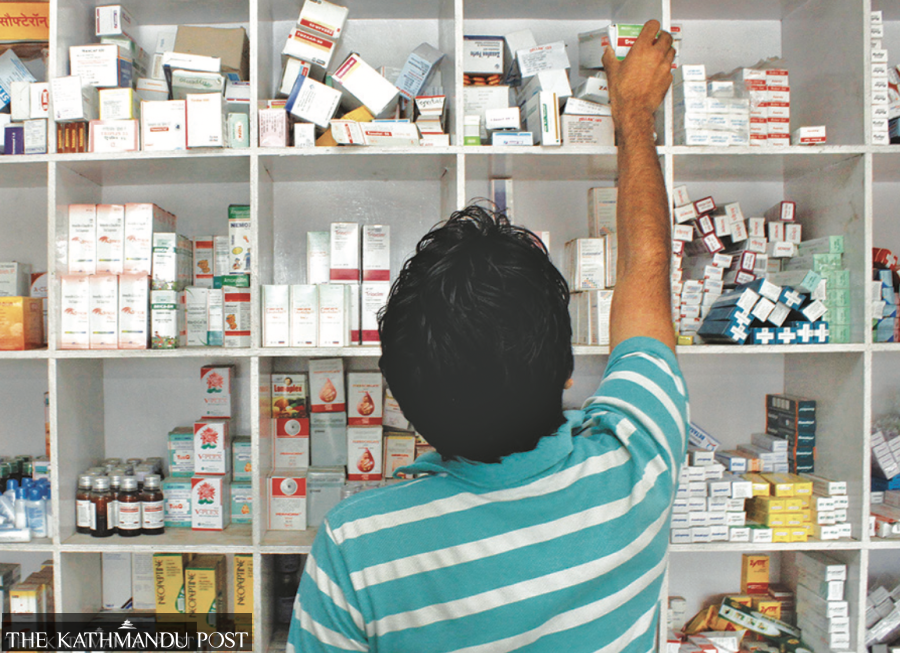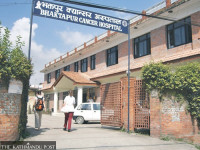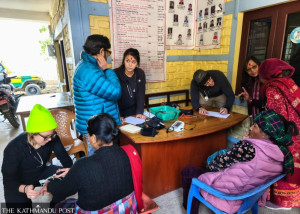Health
Cash crunch forces Nepal to halt on-site drug testing
Drug regulator says the proposed budget for new fiscal year will be just enough for salaries.
Arjun Poudel
Last year, the Department of Drug Administration had started carrying out on-site testing of medicines to ensure the quality of drugs prescribed to patients. The field-based screening was started with the financial and technical assistance of the US Agency for International Development (USAID).
Officials at the department, the national drug regulator, had planned to expand the initiative with financial support from the USAID and also proposed a government budget for the initiative.
However, neither did the USAID provide the committed aid, nor did the government [Health Ministry] allow the department to proceed with executing the planned initiative.
“On-site testing of drugs would have been effective in countries like ours, which have been grappling with the crunch of human resources to ensure quality of medicines,” said Narayan Dhakal, director general of the department. “But we could not convince our government and the aid agency.”
Officials at the department said many countries practice drug testing outside laboratories, which gives immediate results within minutes of collecting samples. Basic qualities of the drugs—identification, disintegration, visual inspection for cracks, splitting, capping and cavitation, as well as contamination, foreign matter, presence of empty capsules, stickiness, color and odor of the solution, taste of liquid, labeling, brand name, generic name, among others—would be examined during on-site testing, according to them.
The national drug regulator had trained its 28 drug inspectors and technicians to deploy to hospitals across the country for the on-site testing of prescription medicines. Along with this, a four-day field-based screening training for drug inspectors was also conducted.
Officials said that a halt to the on-site testing of medicines is among multiple health programmes affected by the aid suspension by USAID, Nepal’s major healthcare donor, and budget cuts by the Ministry of Health and Population. They say multiple programmes under every agency within the health ministry have been affected or halted, which will have serious consequences to public health in the future.
According to the DDA officials, they had also planned to launch a campaign to make people aware of the quality of medicines, health risk of taking over-the-counter drugs, irrational use of antibiotics, and capacity-building training for department officials in the ongoing fiscal year.
“We also wanted to upgrade our own laboratory [National Medicine Laboratory] so that we can apply for an ISO [International Organisation for Standardisation] certification,” said Dhakal. “For the upgrade, equipment should be improved and staff of the laboratory must be trained accordingly, which needs huge resources.”
ISO certification is a formal recognition of a laboratory meeting all required standards set by the organisation. It is also an assurance that the laboratory ensures quality, safety, efficiency and consistency in its services. An accredited body performs an external assessment of the laboratory’s compliance with ISO, which also includes a thorough audit process including document review, on-site assessments, and proficiency testing.
Officials complained that the budget ceiling allocated for the department is sufficient only to pay staff salaries.
“We have not proposed any new programme for the upcoming fiscal year 2025-26,” said Dhakal. “The budget ceiling given to the department is not even sufficient to continue ongoing programmes — regulation of drug markets, including quality checks.”
Ensuring the quality of medicine in Nepal has always been an issue, as the drug regulator struggles with a shortage of staff, and its laboratory doesn’t have the capacity to carry out timely tests.
Drug inspectors deployed from the DDA collect drugs through random sampling and send them for testing in the government’s laboratory. If the drugs are found to be problematic or substandard, the department directs the manufacturing companies concerned to recall those drugs from the market. However, the department does not have an effective mechanism to ensure the recall.
In most cases, delays in testing at the laboratory mean that results come in only after all the substandard drugs in the market have been sold.
Experts say the use of substandard medicines could adversely affect patients’ health.
While thousands of medicines manufactured by national as well as international pharma companies are being sold from pharmacies across the country, DDA inspectors collect only around 1,000 samples from the market in a year. The inspection work is especially daunting because DDA has only around two dozen drug inspectors tasked with monitoring over 24,000 registered pharmacies and thousands of unregistered ones.
It takes several months to examine some medicines, as the DDA’s laboratory is understaffed, with several posts for technicians remaining vacant. The department allows the drug manufacturing companies to supply medicines to the market directly from the factory.




 10.12°C Kathmandu
10.12°C Kathmandu














